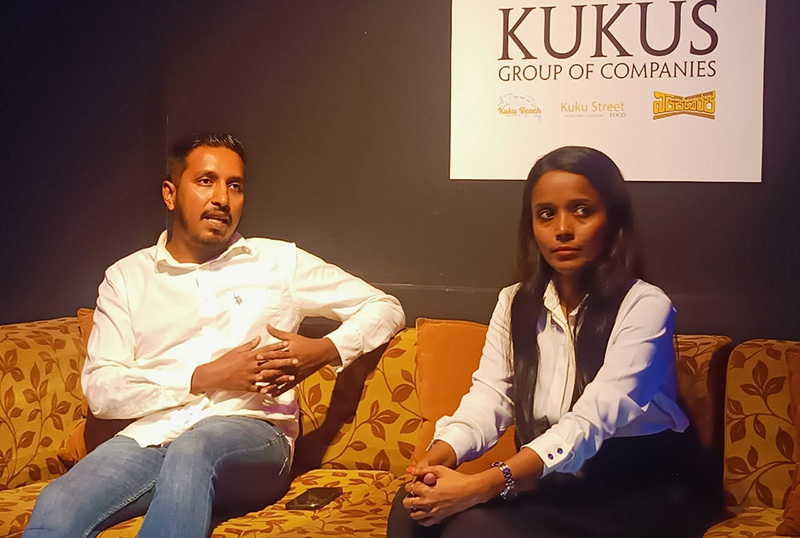Business
Sri Lankan hair extension specialist benefits from export order surge

Says SL should be part of the billion-dollar industry
By Sanath Nanayakkare
One may often hear panelists at business forums waxing eloquent about domestic value additions to imported raw materials for re-export and earning valuable foreign exchange for the country.
But one would rarely hear about a self-made Sri Lankan woman entrepreneur who is slowly but steadily attracting global attention towards Sri Lanka — for transforming imported human hair supply into stylish hair solutions for women — who face loss of hair and suffer from low esteem.
The Island Financial Review recently had an interview with the presidential award-winning hair extension specialist, Dr. Kaveesha Bethmage who is the owner /CEO of Salon Kaveesha International (Pvt) Ltd in Dematagoda where 30-hair extension artisans are employed.
“No matter which country we are from and what our differences may be, we all have a strong view of hair. Hair is a subject that is very important to women and their self-esteem. We often see our hair as a reflection of our identity because it is both personal and public. The positive or negative view of hair can greatly affect a woman. Hair, its length, texture and colour, all affect how a person looks and how they will be perceived. Lack of hair is not only directly associated with the appearance of a woman, but it also can significantly contribute to a loss of confidence resulting in many other negative personal implications. This is especially important for women with medical conditions that result in receding hairline. Needless to say more, hair is one of the assets for women”, says Kaveesha.
“Salon Kaveesha’s hair extensions are a quick fix for length and volume. Our products make our clients feel more confident as they blend with their own hair. This is always custom work, and my team is well-trained to adapt the extensions to the client’s hair structure, texture, colour and style preferences”, she says.
Delving into the pig picture of the industry she says,” Only a very few people know that the hair extension industry is more or less like the jewellery industry because the raw materials of both industries are valuable and hard to find. However, there is a distinct difference between the two supplies. A woman with the right volume of hair can look stunning without any jewellery. But the other way round is never true. This is why the hair extension industry is a billion-dollar industry in the world.
Sri Lanka can claim a sizable market share in this industry as many foreigners wouldn’t mind travelling to Sri Lanka to get this service and enjoy a short stay here,” “We already have a lot of expats coming to get our products and services. Our newly launched website has paved the way for us to receive an increasing number of orders from the USA, Canada, UK, Italy, Germany, Australia, the Middle East etc. Our AI-driven online platform enables virtual hair extension try-on for potential clients. So, they can see themselves virtually with their preferred hair extensions and place their orders. Usually, the lead time for delivery of an export order is about two weeks, and the prices vary according to the type and style of the chosen extension,” Kaveesha says.
“We have a range of hair extensions for those who can visit Sri Lanka as well as who can’t physically be here, but love to use our products after virtually experiencing it. I am glad that we have seen an increase in the number of online orders since we started exporting in 2020, on a small scale during covid-19 pandemic. The salon was founded in 2003, and our hard work has paid off with our export footprint. I think it’s high time we expanded our business to make it more industrial and globally competitive, and be more visible to the global audiences,” she says.
Kaveesha’s local clientele comprises celebrities, professionals, businesspeople, academics, politicians among other clients.
“Now we want to sell our hair products to the entire world. With this objective in mind, I am planning to establish a new hair products factory including the salon near the Katunayake International Airport to provide easy access to my clients. Then they can have their desired hair extensions within minutes of leaving the arrivals terminal. I know from experience that is how fast they want this critical service.” she says.
According to her, the new eco-friendly facility will cost about Rs. 45 million and it will create at least 60 jobs for industry veterans and novices.
“Our vision is to take Salon Kaveesha to international prominence as a leading provider in the hair and beauty industry. I am confident that the banks I deal with, will support me in financing the new project given the establishment’s proven track record, and my industry experience of more than 20 years.” she says.
Kaveesha points out that one challenge for her business is getting the right equipment and accessories for her trade.
“Hair extensions, hair-to-hair transplants and making innovative hair products from finest human hair is a specialized trade. But we can hardly find the sophisticated tools in Sri Lanka for it. We have to go abroad from time to time to purchase them,” she says.
Buddini Jayanika, manager at Salon Kaveesha said that they have donated many hair wigs to women in marginalized groups who faced hair-loss due to medical conditions and couldn’t afford to buy one. She also mentioned that her CEO believes in giving back to society, and therefore, Salon Kaveesha supports several CSR activities.
The embellishment annually donates hair extensions to cancer patients and underprivileged individuals to boost their confidence and self-esteem. It also provides stationery to students of disabled army soldiers every year to support their education.
Kaveesha’s husband, Lasantha Bethmage is an investor cum director of the establishment.
Business
Sri Lanka sets bold target to slash cash use, seeks unified Fintech regulator

The inaugural Sri Lanka Fintech Summit 2025 concluded with industry leaders and regulators establishing two critical national priorities: a bold target to reduce physical cash usage and a push for consolidated regulatory oversight.
In a key decision, participants set a clear three-year goal to lower the ratio of cash in circulation to GDP from 4.5% to 3.5%. The strategy will focus on digitizing high-cash sectors like transport, utilities, and SME payments, while expanding digital access through post offices and cooperatives.
For the long-term health of the ecosystem, stakeholders agreed to lobby for the creation of a single, unified regulatory authority dedicated to fintech oversight. This aims to streamline approvals and provide clearer guidance for innovators.
“Our members needed to leave with concrete action points,” said Channa de Silva, Chairman of the Fintech Forum, Sri Lanka. The summit, designed as a series of closed-door roundtables with regulators including the Central Bank, produced actionable frameworks. “It was about defining KPIs, setting targets, and giving the industry a shared direction,” de Silva explained.
The outcomes signal a concerted shift from discussion to execution, aiming to build a more inclusive, efficient, and secure digital financial economy for Sri Lanka.
By Sanath Nanayakkare ✍️
Business
Kukus Group plans 18 outlets across three distinct Sri Lankan hospitality concepts

A new force in Sri Lanka’s food industry, Kukus Group, is gaining momentum with a clear vision to deliver authentic cuisine, high hygiene standards, and affordability. Founded by young entrepreneurs Nadeera Senanayaka, Lakmini Gurusinghe, and Randila Gunasinghe, the group has successfully launched its pilot outlet and is now preparing for a significant nationwide expansion.
The inaugural in Kotte has served as a successful proof of concept. Operating for five months, this modern street-food outlet has garnered a strong customer response, confirming market demand and providing the confidence to fund the group’s ambitious growth strategy.
“The positive reception has been overwhelming and has solidified our plans,” said Lakmini Gurusinghe and Randila Gunasinghe. “Our Kotte outlet is the operational model we will replicate – ensuring consistent quality, disciplined operations, and excellent service across all future locations.”
The group’s expansion strategy is built on three distinct thematic brands:
Kukus Street: Targeting young urban customers, these outlets offer a vibrant, casual dining experience with a menu of Sri Lankan rice and curry, kottu, snacks, and BBQ, with most meals priced under Rs. 1,500. Services include dine-in, takeaway, and delivery.
Kukus Beach: Planned for coastal areas, beginning in the South, this concept will feature an urban-style beach restaurant and pub designed for relaxed social dining.
Kukus Bioscope: Celebrating Sri Lanka’s cinematic heritage, this dedicated restaurant concept will create a nostalgic cultural space inspired by the golden eras of Sinhala cinema, with the first outlet slated for Colombo.
The immediate plan includes transforming the flagship Kotte location into Kukus Pub & Bar, pending regulatory approvals. The long-term vision is to develop 18 outlets nationwide: 10 Kukus Street locations, 5 Kukus Beach venues, and 3 Kukus Bioscope establishments.
“Kukus Group is more than a hospitality brand; it’s a celebration of Sri Lankan flavors and culture,” the founders concluded. “Our mission is to build trusted, recognizable brands that connect deeply with communities and offer lasting cultural value alongside authentic cuisine. We are dynamic and excited to proceed with this strategic expansion,” they said.
By Sanath Nanayakkare
Business
Fcode Labs marks seven years with awards night

Fcode Labs marked its seventh anniversary by hosting its annual Awards Night 2025 at Waters Edge, celebrating team achievements and reinforcing its organizational values.
The event featured keynote addresses from Co-Founders & CEOs Buddhishan Manamperi and Tharindu Malawaraarachchi, who reflected on the company’s annual progress and future strategy. Chief Operating Officer Pamaljith Harshapriya outlined operational priorities for the next phase of growth.
Awards were presented across three key categories. Prabhanu Gunaweera and Dushan Pramod received Customer Excellence awards for partner collaboration. Performance Excellence awards were granted to Munsira Mansoor, Thusara Wanigathunga, Thushan De Silva, Adithya Narasinghe, Avantha Dissanayake, Amanda Janmaweera, Sithika Guruge, and Sandali Gunawardena. The Value-Based Behaviour awards were given to Thilina Hewagama, Udara Sembukuttiarachchi, and Kavindu Dhananjaya for exemplifying company values.
-

 News1 day ago
News1 day agoSajith: Ashoka Chakra replaces Dharmachakra in Buddhism textbook
-

 Business1 day ago
Business1 day agoDialog and UnionPay International Join Forces to Elevate Sri Lanka’s Digital Payment Landscape
-

 Features1 day ago
Features1 day agoThe Paradox of Trump Power: Contested Authoritarian at Home, Uncontested Bully Abroad
-

 News6 days ago
News6 days agoInterception of SL fishing craft by Seychelles: Trawler owners demand international investigation
-

 Features1 day ago
Features1 day agoSubject:Whatever happened to (my) three million dollars?
-

 News6 days ago
News6 days agoBroad support emerges for Faiszer’s sweeping proposals on long- delayed divorce and personal law reforms
-

 News24 hours ago
News24 hours agoLevel I landslide early warnings issued to the Districts of Badulla, Kandy, Matale and Nuwara-Eliya extended
-

 News1 day ago
News1 day ago65 withdrawn cases re-filed by Govt, PM tells Parliament














